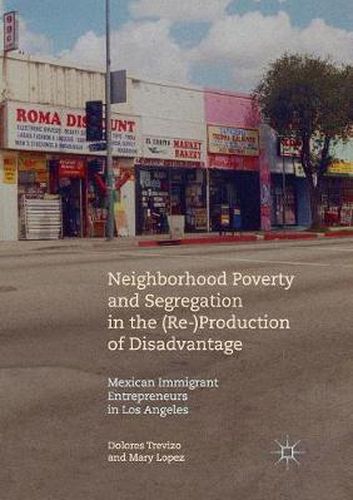Readings Newsletter
Become a Readings Member to make your shopping experience even easier.
Sign in or sign up for free!
You’re not far away from qualifying for FREE standard shipping within Australia
You’ve qualified for FREE standard shipping within Australia
The cart is loading…






This title is printed to order. This book may have been self-published. If so, we cannot guarantee the quality of the content. In the main most books will have gone through the editing process however some may not. We therefore suggest that you be aware of this before ordering this book. If in doubt check either the author or publisher’s details as we are unable to accept any returns unless they are faulty. Please contact us if you have any questions.
Focusing on shopkeepers in Latino/a neighborhoods in Los Angeles, Dolores Trevizo and Mary Lopez reveal how neighborhood poverty affects the business performance of Mexican immigrant entrepreneurs. Their survey of shopkeepers in twenty immigrant neighborhoods demonstrates that even slightly less impoverished, multiethnic communities offer better business opportunities than do the highly impoverished, racially segregated Mexican neighborhoods of Los Angeles. Their findings reveal previously overlooked aspects of microclass, as well as legal capital advantages. The authors argue that even poor Mexican immigrants whose class backgrounds in Mexico imparted an entrepreneurial disposition can achieve a modicum of business success in the right (U.S.) neighborhood context, and the more quickly they build legal capital, the better their outcomes. While the authors show that the local place characteristics of neighborhoods both reflect and reproduce class and racial inequalities, they also demonstrate that the diversity of experience among Mexican immigrants living within the spatial boundaries of these communities can contribute to economic mobility.
$9.00 standard shipping within Australia
FREE standard shipping within Australia for orders over $100.00
Express & International shipping calculated at checkout
This title is printed to order. This book may have been self-published. If so, we cannot guarantee the quality of the content. In the main most books will have gone through the editing process however some may not. We therefore suggest that you be aware of this before ordering this book. If in doubt check either the author or publisher’s details as we are unable to accept any returns unless they are faulty. Please contact us if you have any questions.
Focusing on shopkeepers in Latino/a neighborhoods in Los Angeles, Dolores Trevizo and Mary Lopez reveal how neighborhood poverty affects the business performance of Mexican immigrant entrepreneurs. Their survey of shopkeepers in twenty immigrant neighborhoods demonstrates that even slightly less impoverished, multiethnic communities offer better business opportunities than do the highly impoverished, racially segregated Mexican neighborhoods of Los Angeles. Their findings reveal previously overlooked aspects of microclass, as well as legal capital advantages. The authors argue that even poor Mexican immigrants whose class backgrounds in Mexico imparted an entrepreneurial disposition can achieve a modicum of business success in the right (U.S.) neighborhood context, and the more quickly they build legal capital, the better their outcomes. While the authors show that the local place characteristics of neighborhoods both reflect and reproduce class and racial inequalities, they also demonstrate that the diversity of experience among Mexican immigrants living within the spatial boundaries of these communities can contribute to economic mobility.